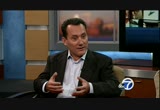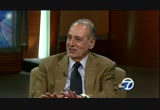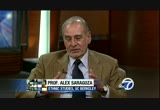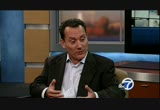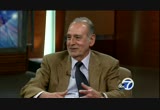tv Beyond the Headlines ABC September 30, 2012 10:00am-10:30am PDT
10:00 am
♪ ♪ >> welcome to "beyond the headlines", i'm cheryl jennings. today we have a very special roundtable discussion in celebration of hispanic heritage month. abc7 news reporter lyanne melendez is here to lead an in-depth conversation about some of the issues facing the latino community. >> reporter: thank you, cheryl.
10:01 am
hispanic heritage month begins last month and ends on october 15th. some of the topics we will be discussing includes economic development in the latino development and health care. but the first the face of the united states of america is changing. the data shows a shift in the ethnic many of the nation's population and with the presidential election around the corner the latino is one that will make a difference. >> it's official the complexion of america is changing the for the first time more the half the nation's babies were minorities. new estimates show that 50.4% of children were black, hispanic or asian-american or other minority groups. in 1990 it was just 37%. it's a significant landmark that they say is not very surprising. >> we have seen this trend
10:02 am
heading in that direction over the last decade. >> minorities make up 30% of the u.s. population and that figure continues to rise. already four states in the district of column i don't have minority population that exceed 50%. >> hispanics are the faster minority population. they increase 3.1% between april 2010 and july 1011 and now at 50 million. >> this is a watershed moment. >> the shifting demographics are having a major implication on politics. both campaigns are stepping up to reach voters. >> then we know that we are population is growing we have an opportunity to be able to turn that into both political and civic power. >> reporter: now it's time to introduce our guests that are joining us for this special
10:03 am
discussion. she the is a political reporter for the san francisco chronicle, marisa lagos and founder and ceo of pueblo food market. juvenal chavez and finally professor alex saragoza. >> thank you for being here. >> let's talk about the importance of the latino vote in the presidential election u.s. more important today than ever before? >> absolutely. as we just heard the latino population around the nation has been growing as well as minorities in general. here in california we have more than half of our population is quote, unquote, minority. both the republicans and democrats are trying to appeal to this population.
10:04 am
it's a population that those parties are trying to appeal to. it's an interesting one because we talk about it, but i think we're going to see as time goes on more. in that you have traditionally more religious catholics belief systems and younger generation that was born here. maybe not as much of that. it's a shift in population and one that candidates are trying to chase. >> reporter: so the numbers suggest that mitt romney needs 40% of the hispanic vote. i don't like to bet, but i can tell you right now he doesn't have close to 40%. according to a poll it's 32%. what do republicans need to do to attract the latino vote? >> i don't think they can do much. i don't think you will get near the 40%. one of problematic issues a lot
10:05 am
of the latino vote die nap sick responsive to specific situations. take for example arizona where there was hen o been an 50% increase in the number of registered voters among latinos there. a lot of it has to do with events in arizona that we all know about. to the extent we have situations like what is taking place in arizona and utah, indiana, georgia and so on, where there is a type of anti-immigrant legislation that has been proposed and debate that it generates, it puts mitt romney and republicans in a tough situation. they can't dismisses those movements on the one hand and say we're not with you, but on the other hand by not doing, that it inhibits latinos from considering republicans as viable option. >> you have your base here, anti immigrant and concerned about border security and then you
10:06 am
have this need to appeal to the latino vote. i think that is something we have seen every republican candidate in the last decade struggle with. >> reporter: let's talk about the dream act. is that something the candidates need to talk about now or should they put it off? >> i can say, since i've been dealing with hispanics all my life, it is important for us to make sure that we bring these issues to the front lines to the people who have the capacity to make the decisions. that they are making a good education for the latino population. i don't think that children. to fijs the issue as a whole and i think it's so important. >> reporter: did it bother hispanics that obama waited so long to focus on the dream act?
10:07 am
>> i think so. because we need much bigger reform. the whole latino community, we are ripe for immigration reform that is more humane and more considerate and more respectful to the community. >> reporter: where do you see them voting in 2016? >> it will be much more involved community. it will be harder for candidates especially the republican side, but both sides to really ignore it. you have to look at the reality. we talked about the dream act. president in the first years of the administration pushing healthcare reform which is something that impacts every american. i think a lot of minority groups for him waiting so long but
10:08 am
those are interesting because a lot of latinos may not support. that you have to look at the political realities but at the end of the day. i don't think that romney wants to talk about this. i don't think unless we see a key change in the republican base that they are going to want to talk about it in four years. >> reporter: you mentioned healthcare that is very important. we'll talk about latinos and healthcare. stay with us.
10:10 am
>> reporter: welcome back. i'm lyanne melendez. today we are celebrating hispanic heritage month. again, welcome, let's turn our attention to healthcare. according to u.s.a. gallup poll, healthcare is most important issue to hispanics. why is it more important say immigration politics and other issues? why is it number one today? >> i think there is two reasons. one is the youthfulness of the latino population means a lot of latinos are concerned about the welfare of their children healthcare being an important one. the other end of the spectrum even though the latino
10:11 am
population as a whole is relatively young, because of previous immigrants there is a sizable aging population of latinos. they are concerned about healthcare for grandparents or parents depending their age. that two sided element in the latino population makes healthcare very important issue. >> how do we increase the numbers of people on healthcare? >> i think we could ask that of any ethnic group. we don't really what the impact is. all we have seen kick insofar is insurance up to a later age in their 20s which doesn't help if your parents don't have insurance. so how do we increase access, no matter what your job is, more blue collar job or not
10:12 am
necessarily working in a full-time job. >> it's too early to say if it's helpful or hurt hispanics? >> until 2014 until we see the mandate kick in, the push towards universal type of insurance, it's not that, but we don't really know. california is ahead from a state level to implement some of the affects of it. the whole idea is to get people into primary care and we don't know how it's going to play out. >> reporter: because we're spending too much money on it. what is the biggest challenges for employers like yourself when it domes healthcare. >> so an asset for any company and we are providing insurance and it's very expensive. we don't have the best solution.
10:13 am
we cannot ignore teaching our people to keep a healthy party. it's like wealth. educating our people. and the older ones, i remember when i had -- they talk about the health of the little ones. so we have tremendous opportunity in the hispanic community. >> reporter: let's talk about that because that is something very interested in preventative medicine and educating all. >> that is key issue. >> reporter: and how to eat healthy and how to exercise and how to avoid getting diabetes and other illnesses. where do we start?
10:14 am
education? >> education. unfortunately we don't do enough health education. take any major, when did you see anybody from the department of agriculture, this is really good for you. eating fresh vegetables and so on. in that sense, the private sector has been probably better at health education than we have in the public sector in that regards despite a lot of passengers with diets and schools and so on. it's not a consistent message. >> reporter: next our guests will talk about the economy, what are the biggest concerns facing the latino community and what is being done about it. we'll be right back with more "beyond the headlines."
10:16 am
10:17 am
hispanic heritage month. our next topic is the economy, jobs. now according to the u.s. department of labor, the august report of the unemployment rate of latinos reached 10.3%, that is more than 2% higher than the national average. can i ask you all how we can explain those numbers? >> this recession has just had an enormous impact on latinos. between 2005 and 2009 median household income went down by 66%. a lot of it had to do with foreclosure crisis and a lot of jobs most vulnerable were filled by latinos. service sector is very sensitive of people not going out to eat, everything from washing your car. so in that respect, the recession has had a tremendous
10:18 am
impact on latinos in a negative way. >> reporter: what is going to turn things around? >> i think the private sector. people who take the chance and take a step forward to make a difference, i think that is going to really than the solution. the hispanics were most affected why? because we live in a cash economy. so we made decisions in a very different way. mine is my wallet and i don't have it in there. more people are coming in, that is more people traveling across
10:19 am
the borders. but where they are coming from, a lot of people they become citizens. so they stay out there longer and that has an affect in us in what we experience day to day. >> reporter: do you want to add to? >> that i think it's interesting we don't hear the same debate the closing of our borders the sort philosophical debate is still there but the daily come and go. if you are in any area of the economy that was hardest hit by the housing down turn, especially construction. we have seen farm workers and all these areas that are sort of on the margins. i think what we have to talk about is those people that are underemployed, not just having a
10:20 am
job but not having enough work. >> reporter: what is the biggest hurdle for latino businesses right now? >> moving forward. the private sector is going to make a difference. the hispanic community is very resilient moving forward. once we get out of this mess but we have to have faith. we have to move forward and create a better tomorrow. >> reporter: what is our role in the u.s. economy as hispanic? >> for me. in addition to the private sector that has to be a greater investment in the ground floor and that means education. if we don't invest in education, whatever the private sector can do is going to be constrained by that. the pipeline has too many leaks
10:21 am
from kindergarten to say college. that leakage, that hemorrhaging has to stop otherwise those opportunities afforded by the private sector are not going into the right hands. >> reporter: really talk about that in a few minutes when "beyond the headlines" continues we'll wrap up our discussion talking about education and what the future holds for today's generation of young latinos. we'll be right back. [ male announcer ] this is the opposite of subliminal advertising... there's no subtext...
10:22 am
10:23 am
>> reporter: welcome back to "beyond the headlines", i'm lyanne melendez and today we are celebrating hispanic heritage month. let's talk about education, very important, using newest numbers, they reported that hispanics are the largest minority on college campuses, hayes are the largest minority in college, two million enrolled in four-year colleges, 140,000 bachelor degrees and
10:24 am
112,000 associate degrees. let's start with you professor, what do the numbers mean and what do we expect? >> on the one hand, it's a whole lot better than it used to be. there is still a lot of holes and maybe the pipeline is broken in getting kids from kindergarten to the university. along that pipeline there are horrible situations in the sense that our investment in public education, i'm talking about the k-12 system, i think in many parts of the united states is very bad shape. it has an impact on latinos because so many latinos are young and so many latinos are increasing in terms of k-12 education. we're not investing in education long term effects on latinos is not going to be good. >> reporter: that is base, k-12. >> i w sio si, i think
10:25 am
the total population, you are hurt if you live in a low income area. because the way we do school funding the income of the area. you get to the college level, middle income students that are most left out these days because we've seen tuitions increase and aid has fallen, i think you still have lot of opportunities for scholarships and grants. but if your parents have enough money to make a good life for themselves, it may not be as op wide for you. >> reporter: are we able to afford college? >> the income and equality figures. there is still a lot of big division. with foreclosure situation and all that has been exacerbated. we have too many latino kids
10:26 am
going to not so great schools that translates into more difficult difficulty. >> you have a scholarship program i have a program, can you talk about that? how do you counted the hispanic kids? >> i think location is not everything. if you want to be successful in life you need a formal education you have to be educated so we know how much we spend so they learn the skills for the job. >> reporter: how does it work your scholarship program? >> it works in this way. we enroll the community, vendors and members and company. we raised almost $300,000. more so than are going to
10:27 am
college. we understand in our community what is the great need that is existing. we like them to do everything in their capacity to make sure we put one kid through college it's a win-win situation. >> i think the hispanic community has to get more involved. >> everyone in the family, in the community, in the schools, in the churches and in the businesses. we need to confront this. so we have to make sure that we can do it. >> reporter: where do you see the latino community in ten years? >> i think this is going to be a community that is going to be under educated but with tremendous dreams. >> i think the latino community they can make decisions better. >> i'm optimistic. i think it's going to be a
10:28 am
bigger part of the middle-class and generations will get more involved. >> reporter: that is all the time we have for now. thanks for the fascinating discussion. i'm lyanne melendez. hasta luego. >> cheryl: thank you leanne. information that we talked about today is available for you on our website. find us on facebook on community affairs and follow me on t-shirt at which i recall at abc7. have a great week.
94 Views
IN COLLECTIONS
KGO (ABC) Television Archive
Television Archive  Television Archive News Search Service
Television Archive News Search Service 
Uploaded by TV Archive on

 Live Music Archive
Live Music Archive Librivox Free Audio
Librivox Free Audio Metropolitan Museum
Metropolitan Museum Cleveland Museum of Art
Cleveland Museum of Art Internet Arcade
Internet Arcade Console Living Room
Console Living Room Books to Borrow
Books to Borrow Open Library
Open Library TV News
TV News Understanding 9/11
Understanding 9/11












